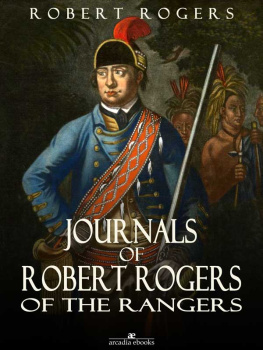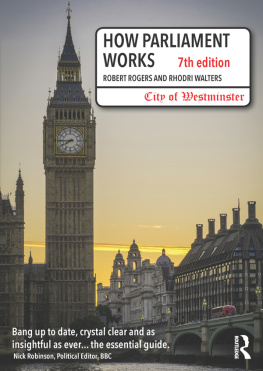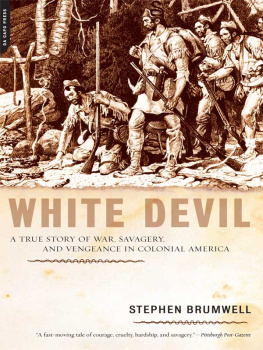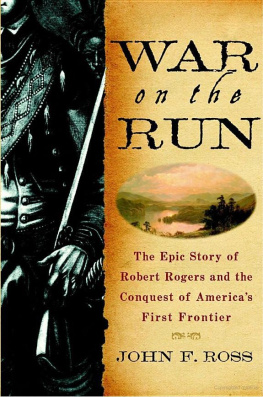Robert Rogers - Journals of Robert Rogers of the Rangers
Here you can read online Robert Rogers - Journals of Robert Rogers of the Rangers full text of the book (entire story) in english for free. Download pdf and epub, get meaning, cover and reviews about this ebook. publisher: Arcadia Press, genre: Adventure. Description of the work, (preface) as well as reviews are available. Best literature library LitArk.com created for fans of good reading and offers a wide selection of genres:
Romance novel
Science fiction
Adventure
Detective
Science
History
Home and family
Prose
Art
Politics
Computer
Non-fiction
Religion
Business
Children
Humor
Choose a favorite category and find really read worthwhile books. Enjoy immersion in the world of imagination, feel the emotions of the characters or learn something new for yourself, make an fascinating discovery.
- Book:Journals of Robert Rogers of the Rangers
- Author:
- Publisher:Arcadia Press
- Genre:
- Rating:4 / 5
- Favourites:Add to favourites
- Your mark:
- 80
- 1
- 2
- 3
- 4
- 5
Journals of Robert Rogers of the Rangers: summary, description and annotation
We offer to read an annotation, description, summary or preface (depends on what the author of the book "Journals of Robert Rogers of the Rangers" wrote himself). If you haven't found the necessary information about the book — write in the comments, we will try to find it.
Journals of Robert Rogers of the Rangers — read online for free the complete book (whole text) full work
Below is the text of the book, divided by pages. System saving the place of the last page read, allows you to conveniently read the book "Journals of Robert Rogers of the Rangers" online for free, without having to search again every time where you left off. Put a bookmark, and you can go to the page where you finished reading at any time.
Font size:
Interval:
Bookmark:
FRANKLIN B. HOUGH.
The Journals of Major Robert Rogers, giving the details of his services as a partizan officer in the French and Indian war of 1755-60, have been very generally regarded as forming a work of unquestionable historical value. The volume does not profess to be in any sense, a general history of the events of that war, nor a connected account of the military operations of a particular frontier; but simply a narrative of what he himself saw and did, with here and there a brief allusion to the doings of others, where they seemed in some way to have had relation to his own. Being evidently written with a view of promoting his own military reputation, as he may have doubtless felt that he deserved, it would be surprising if he had been uniformly as fair in his account of others as of himself, or if his narratives were in all respects such as another, as well acquainted with every fact and circumstance, and without personal motives, would have written. An author in describing his own acts, does not naturally seek to expose his own errors, nor always to conceal those of others; nor can we expect, in scenes and circumstances like those which our author describes, that no jealousies, or rivalries, or disappointments were encountered, that might sometimes influence his conduct, and show themselves in his writings. Such, upon several occasions, will be noticed by the careful reader of his Journals nor should they be regarded as exceptional, in publications of this class, where the exploits of the written form the principal theme.
The general tenor of the narrative, and details in abundance, are however well verified by independent authorities, and justify the belief that the accounts of services here given, are in the main reliable, and that the work fairly presents the condition of affairs, as they existed, and the events, as they occurred, in the time and manner described.
The incidents in the early life of this partizan soldier, are for the most part lost; but from his own statement, the rude and rugged hardships of a frontier settlement, were of such a character that he could hardly avoid gaining a thorough practical knowledge of the manners, customs and language of the Indians hear whom he was reared, and a general acquaintance with the wild and hardy forest life of the pioneers. He mentions the twelve years that immediately preceded the war in which he served, as full of hardships, and particularly well calculated to qualify him for the arduous duties of the service in which he engaged.
Of the ancestry of this celebrated Ranger we have few details. He was the son of James Rogers originally from Ireland, or of Irish descent, and one of the first settlers of Dunbarton, now in Merrimack county, New Hampshire, first known as Starks-Town. The settlement of this town began some years before 1746, but at what time cannot now be ascertained. Robert Rogers was born in Londonderry, N. H., (or Methuen Mass.), in 1727, and was probably fourteen or fifteen years of age, when his father began a settlement in the wilderness. From his youth, he was inured to the hardships of the frontier, acquiring that character of decision, self-reliance and boldness, which distinguished him in after life. He was six feet in statute, well proportioned, and one of the most athletic men of his time, well known in all the trials of strength and activity among the young men of his vicinity, and for several miles around.
Of his entrance into the military service, at the age of twenty-eight years, and his perilous adventures until the final surrender of the French posts in the West, ample details are given, mostly from his own pen, in the following pages. His name and fame appear to have become familiar throughout the country, and in both armies; and in a military point of view, his services must be regarded as of the first importance to the British cause. The brutal warfare of his day, resulting from a century of murderous invasion and vindictive reprisal, had grafted upon the system every custom that was horrid and barbarous. Each of the nationalities then contending for the mastery of the Continent, had brought to its aid the cunning and cruel Savage; had taught him the use of arms more destructive than his native weapons, and had stimulated his passions by every art and motive, until humanity to the wounded, or mercy to the captive were unknown; and if the prisoner escaped the scalping knife and the stake, he was led off into a captivity often worse than death.
Through scenes of peril and danger which threatened every step, our partizan soldier passed without serious harm; but we can scarcely believe that the attractions of home, or the ease of private life, had many charms for him, when the war was over, and not an enemy could be found throughout the length and breadth of the Continent, which the winning Government found it necessary to repress.
Nor is there room for doubt, but that amidst the scenes of bloodshed of which he witnessed so much, and took so active a part, the finer sensibilities of humanity were lost in moments when expediency or policy dictated to the contrary; for in the reports made immediately upon his return from a scout, we find it mentioned, that he had scalped the dead within sight of a French garrison, and murdered a prisoner when too badly wounded to march.
Major Rogers married, but at what period is unknown, a Miss Elizabeth Browne, or as some accounts give it, Elizabeth Furness, of Portsmouth. She obtained a divorce, and afterwards married Capt. John Roche, or Roach of Concord.
In the troubled times which preceded and attended the siege of Detroit, by Pontiac, in 1763, Major Rogers was sent with a body of troops to the relief of that garrison, and he assisted in the sortie upon the occasion that Captain Dalyel was killed.
After the surrender of the western posts, Rogers engaged in an expedition against the Cherokees in the south under the orders of General Grant, but no details of this enterprise, have come to our notice: and on leaving the service he was retired upon half pay. His accounts appear to have been embarrassed from want of vouchers, so that it was not until 1763, that he secured a settlement with the Provincial Government of New Hampshire, for services rendered eight years before. The trouble that he encountered in adjusting these claims, appears to have arisen from a negligent habit in the keeping of accounts, and probably in some degree from the death of persons whose living testimony would have sustained his claims.
Not long after this, Rogers went to England, to present his claims for accounts, and while there, published the work which we now reproduce. The title-page of the original edition shows that it was printed for the author, probably on subscription, and in the same year another work, with still the promise of a continuation, which, so far as we can ascertain, never appeared.
The other work published by Major Rogers in London in 1765, have the following title:
A Concise Account of North America; containing a Description of the several British Colonies on that Continent, including the Island of Newfoundland, Cape Breton, &c., as to their Situation, Extent, Climate, Soil, Produce, Rise, Government, Religion, present Boundaries, and the number of Inhabitants supposed to be in each. Also of the Interior, or westerly Parts of the Country, upon the Rivers St. Lawrence, the Mississippi, Christino, and the Great Lakes. To which is subjoined, an Account of the several Nations and Tribes of Indians residing in those Parts, as to their Customs, Manners, Government, numbers, etc. Containing many useful and entertaining Facts, never before treated of. By Major Robert Rogers, London: Printed for the Author, and sold by J. Millan, Bookseller, near Whitehall. MDCCCLXV, 8vo, pp. 264.
In the first of these publications, the author announced his intentions of publishing an account of his travels into the Cherokee country and the Southern Indians; of his second tour into the interior country, upon the Great Lakes; and of the Indian wars in America since the year 1760; together with correct plans of all the British posts upon the continent. In the second, of the above noticed publications, he proposed to issue a volume containing maps of the several colonies, and of the interior country of North America, more correct, and easier to be understood than any yet published. The price of each, was to be an English guinea, but so far as we are informed, nothing further of this nature appeared under his name, relating to American affairs.
Font size:
Interval:
Bookmark:
Similar books «Journals of Robert Rogers of the Rangers»
Look at similar books to Journals of Robert Rogers of the Rangers. We have selected literature similar in name and meaning in the hope of providing readers with more options to find new, interesting, not yet read works.
Discussion, reviews of the book Journals of Robert Rogers of the Rangers and just readers' own opinions. Leave your comments, write what you think about the work, its meaning or the main characters. Specify what exactly you liked and what you didn't like, and why you think so.












